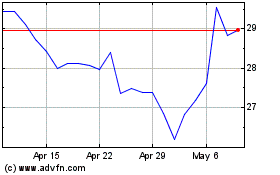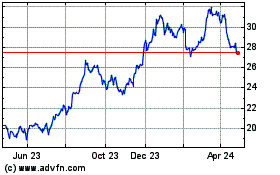UBS Asset Management's Global Real Estate ("GRE") business is
pleased to announce its results in the 2016 GRESB Real Estate and
Real Estate Debt assessments, which measure the sustainability
performance of real estate portfolios worldwide, including property
funds and companies. GRE has continued its strong showing from
previous years, with a record number of GRE funds across the US,
Europe and Asia represented in 2016 and top results achieved in
every region.
Building further on its 2014 and 2015 successes when GRE secured
eight and nine Green Stars, respectively, 14 of GRE's real estate
equity funds from the US, UK, Germany, Switzerland, Luxembourg and
Japan – including three new entrants this year – have been awarded
Green Star status in the 2016 GRESB Real Estate assessment,
reflecting the first year GRE has achieved such a feat for all of
its participating funds.
In addition, seven of these funds, spanning every region and
sector GRE operates in, achieved the highest GRESB rating of
5-stars, reflecting upper quintile performance compared with the
entire universe of participants, and overall, 13 of GRE's 14 real
estate equity funds achieved a GRESB rating of at least
4-stars.
Most notably, one GRE fund investing in core residential real
estate in Switzerland posted the strongest performance in its
sector group (Listed European Residential), achieving Sector Leader
status in its first year participating in the assessment, and a UK
value-add fund investing in Central London offices again achieved
strong performance globally to become the eighth best performer
amongst 733 participants worldwide.
At the same time, GRE's two real estate debt funds in the UK and
US again posted excellent results, with both achieving a GRESB
rating of 5-stars, with the UK fund retaining its position at the
top of the GRESB Real Estate Debt assessment and the US fund coming
in third.
Thomas Wels, Head of Global Real Estate at UBS AM
commented: "Sustainability is something that we take very
seriously at GRE, and it firmly remains a key consideration for us
at the highest levels of our business worldwide. Our continued
success in the GRESB assessments is testament to our long-standing
efforts in this regard and, crucially, to the efforts of our teams
on the ground globally that oversee the consistent implementation
of our Responsible Property Investing policies. I’m particularly
proud of the global nature of GRE’s participation, demonstrating
how important sustainability is in each of the sectors and markets
we operate in, as we aim to coordinate our market-leading best
practices at a truly global level.”
Underpinning GRE's sustainability efforts is GRE's
Sustainability Workgroup, which comprises GRE professionals from
several countries and disciplines, including engineering and
construction, operations, research, asset management, fund as well
as business management, and which has regional representation from
the UK, US, Singapore, Switzerland, Continental Europe, Japan and
Australia. Established in 2010, this Workgroup focuses on setting
high-level objectives and targets and maximizing best practice
sharing, as some technologies or policies start in one country and
are adapted by other regions, and to provide implementation
guidance. This team approach to sustainability has played a
fundamental role in integrating sustainability into all of GRE’s
investment practises worldwide and has enabled the business to
consistently achieve excellent scores across a range of funds ever
since it first participated in the GRESB assessment in 2011.
A summary of GRE's results for 2016 is shown in the table
below.
Fund description
Award
GRESB Rating(1-star = Lower
quintile;5-stars = Upper quintile)
Real estate equity funds
Japan Core Japanese industrial
and infrastructure Green Star 5-stars Core Japanese
retail Green Star 4-stars Core Japanese office
Green Star 4-stars
US
Core US commercial property Green Star 5-stars Value
add US diversified Green Star 5-stars
Switzerland Core Swiss
residential Sector Leader, Green Star 5-stars Core
Swiss diversified (unlisted) Green Star 4-stars Core
Swiss diversified (listed) Green Star 3-stars
Germany Core European office and
retail Green Star 5-stars Core European office
Green Star 5-stars Core German logistics Green Star
4-stars
UK Value add UK
office Green Star 5-stars Core UK commercial property
Green Star 4-stars
Luxembourg
Core Eurozone diversified Green Star
4-stars
Real estate debt
funds UK debt fund n/a
5-stars US debt fund n/a 5-stars
Source: GRESB Real Estate and Real Estate
Debt benchmark reports 2016
GRESB
GRESB (formerly known as the Global Real Estate Sustainability
Benchmark) is an investor-driven organization that is transforming
the way it assesses the environmental, social and governance (ESG)
performance of real assets globally, including real estate
portfolios and infrastructure assets. More than 250 members, of
which about 60 are pension funds and their fiduciaries, use the
GRESB data in their investment management and engagement process,
with a clear goal to optimize the risk/return profile of their
investments. GRESB has assessed nearly 1,100 property companies and
funds, on behalf of close to 60 institutional investors. GRESB is
an independent organization not connected to UBS Asset Management's
GRE business area.
This year's GRESB Real Estate assessment was completed by 759
real estate companies and funds/portfolios (733 excluding
developers) across 63 countries worldwide, representing a total
property value of USD 2.8 trillion and 66,000 individual property
assets under management. GRESB Real Estate collects information
regarding the sustainability performance of property companies and
funds, including information on performance data, such as energy,
GHG emissions, water and waste. The assessment also covers broader
sustainability issues, such as sustainability risk assessments,
performance improvement programs, and engagement with employees,
tenants, suppliers and the community.
GRESB’s global benchmark uses a consistent methodology across
different global regions, investment vehicles and property types.
Participants’ scores are based on seven detailed aspects –
Management, Policy & Disclosure, Risks & Opportunities,
Monitoring & EMS, Performance Indicators, Building
Certifications & Energy Ratings, and Stakeholder
Engagement.
Starting in 2015, GRESB began gathering information regarding
the sustainability performance of companies and funds specialising
in real estate debt. The GRESB Real Estate Debt assessment is
specifically tailored to the functions and processes of real estate
lenders and debt portfolio owners, and is designed to capture
sustainability engagement and performance metrics on a worldwide
basis. The scores of the 18 participants are based on five key
sustainability factors: Management, Policy & Disclosure, Due
Diligence, Monitoring and Opportunities.
UBS Asset Management
UBS Asset Management is a large-scale asset manager, with around
3,5001 employees located in 22 countries. We offer investment
capabilities and investment styles across all major traditional and
alternative asset classes.
We take a connected approach to find the answers to our clients'
investment challenges. Our global capabilities include equity,
fixed income, currency, hedge funds, real estate, infrastructure
and private equity investment capabilities that can also be
combined into customized solutions and multi asset strategies.
Complementing our investment offering, our fund services business
provides professional white-labeling services including fund
set-up, accounting and reporting for traditional and alternative
funds.
Invested assets totaled CHF 633 billion (EUR 584 billion, GBP
487 billion, USD 647 billion) as at 30 June 2016. We are a leading
fund house in Europe, the third largest international asset manager
in Asia, the largest mutual fund manager in Switzerland2 and one of
the largest fund of hedge funds and real estate investment managers
in the world.
UBS Asset Management's Global Real Estate business actively
manages real estate investments of approximately USD 78.4 billion3
globally and regionally within Asia Pacific, Europe and the US,
across the major real estate sectors, making it one of the largest
real estate managers worldwide. Its capabilities are focused on
core and value-added strategies, but also include other strategies
across the risk / return spectrum. These are offered on a global,
regional and country basis and through open- and closed-end private
funds, REIT's, customized investment structures, multi-manager
funds, individually managed accounts and real estate
securities.
This material is provided for information only and is not
marketing. Issued by UBS Asset Management (UK) Ltd. Authorised and
regulated by the Financial Conduct Authority.
© UBS 2016. UBS are among the registered and unregistered
trademarks of UBS. All rights reserved.
www.ubs.com/realestate
__________________________
1 Thereof around 1,100 from Corporate Center (as at 31
December 2015) 2 Source: Morningstar/Swiss Fund Data Swiss
Promoters Report (as of 30 June 2016) 3 Asset under management
stated on gross asset values basis, reflecting property values as
at 30 June 2016. Includes assets managed by our joint venture with
Mitsubishi Corporation, Japan.
View source
version on businesswire.com: http://www.businesswire.com/news/home/20160909005942/en/
MediaFTI ConsultingRichard Sunderland / Dido Laurimore /
Claire Turvey / Ellie SweeneyT. +44-20-3727
1000UBSGRE@fticonsulting.com
UBS (NYSE:UBS)
Historical Stock Chart
From Mar 2024 to Apr 2024

UBS (NYSE:UBS)
Historical Stock Chart
From Apr 2023 to Apr 2024
